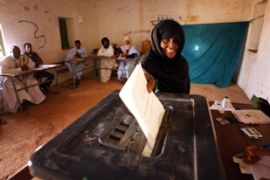Mauritanian landmark poll begins
Mauritanians start voting for civilian president after military rule.

“This is the moment when Mauritanians will come of age,” he said.
Voting
About 2,400 polling stations opened at 7am (07:00 GMT) and voting is being observed by some 300 international electoral observers.
Many citizens said they want the new president to ensure that wealth from the country’s natural resources is distributed more fairly.
|
“We have everything in our country, fisheries, oil, mining. What we want is good government” Diathir Mamadou, Mauritarian civilian |
Black Mauritanians are looking for more equitable government after suffering discrimination and slavery under a centuries-old caste system that kept the white Moorish elite in power.
Slavery was legally banned in 1981 but rights groups say it still exists in parts of the country
A record 19 candidates are aiming for the country’s top job after two weeks of campaigning, which passed off peacefully.
“The campaign went by in absolute calm and without the slightest of incidents,” Vall said.
Sidi Ould Cheikh Abdellahi, an economist and minister under two presidents, has the backing of a coalition of the political forces which commands the majority in parliament.
His main rival is Ahmed Ould Daddah, who has unsuccessfully ran for the presidency twice since 1992.
Legacy
The vote is the final stage in a transition of the country to civilian democracy after the coup ended 20 years of dictatorship under Ould Taya.
“Ould Taya left behind a cumbersome legacy for his successors,” says Mohamed Vall, an Al Jazeera reporter.
“He left a corrupt administration, a controversial partnership with the US on terrorism, an unpopular diplomatic relationship with Israel and a nation still plagued by poverty,” he said.
The outgoing military junta promised to return the country to democracy and step down after a 19-month transition period.
Its members were barred from standing for political office to guarantee transparency in the vote.
It has so far organised a constitutional referendum plus local government and legislative elections.
If no single candidate garners 50 per cent of the votes cast, the election will go to a second round on March 25.